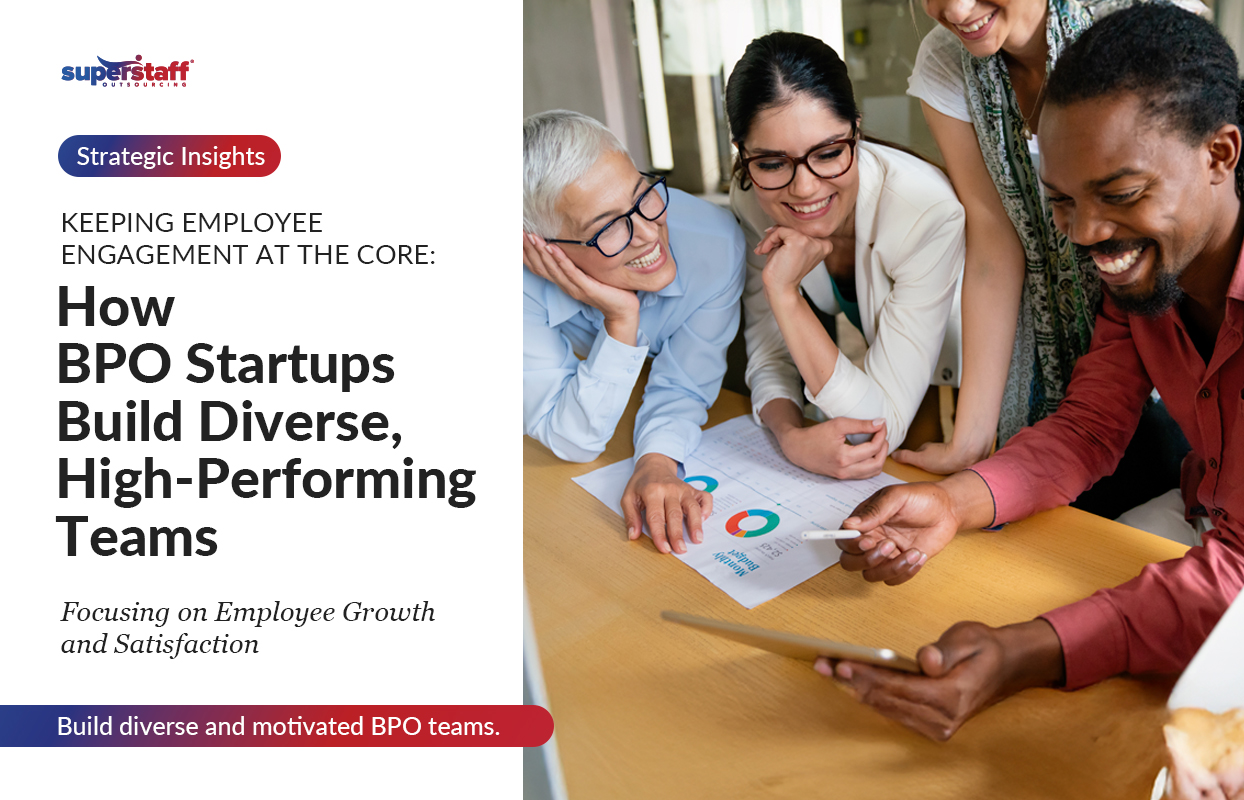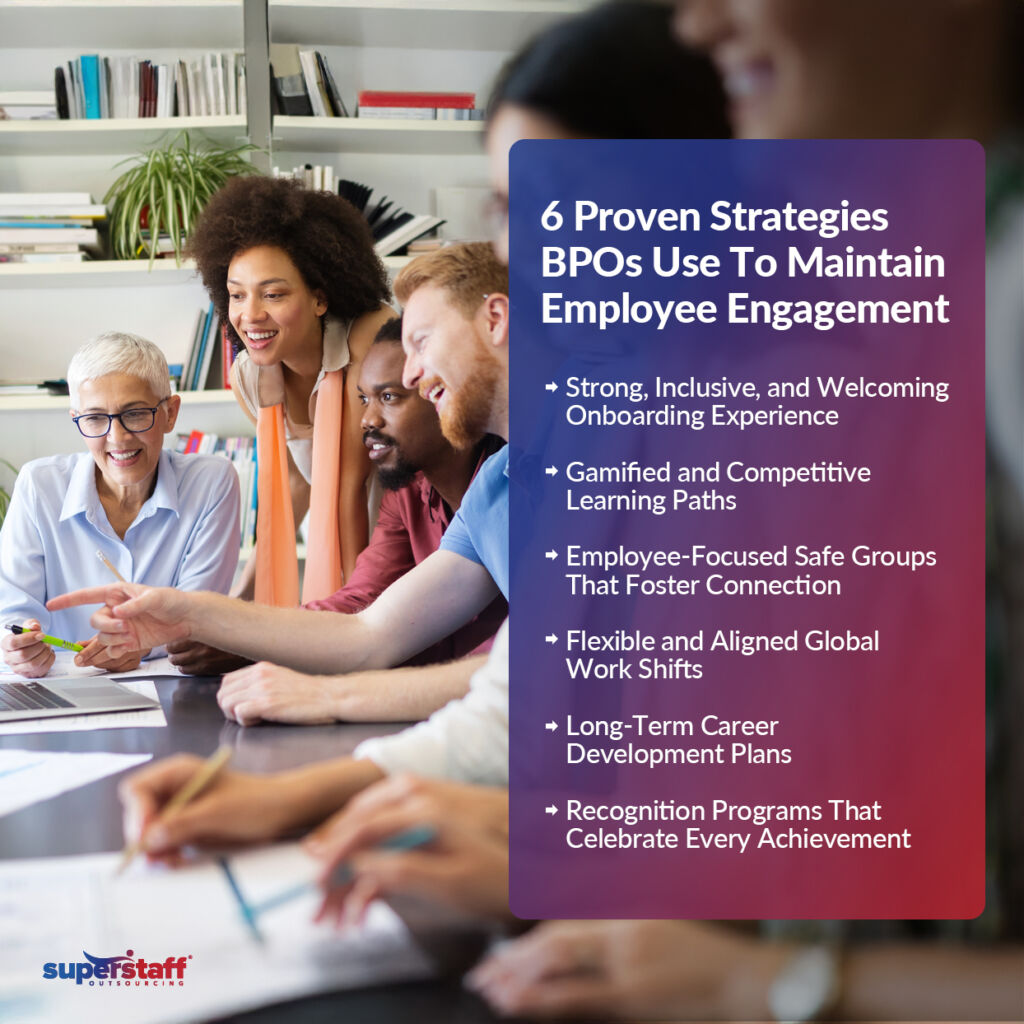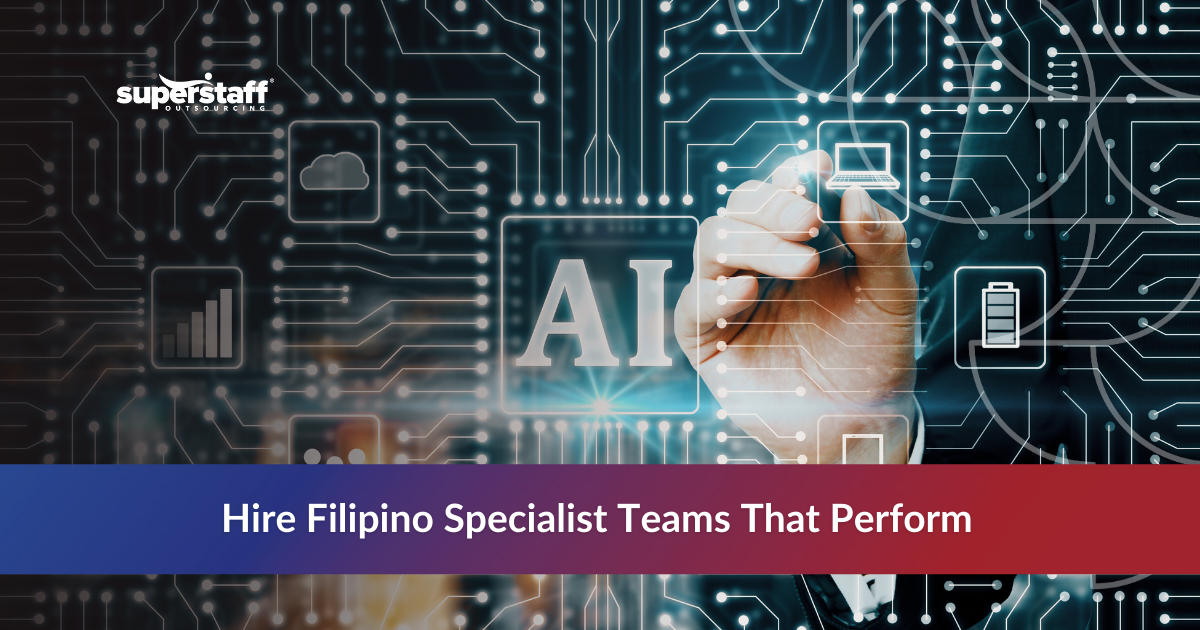
What makes a BPO team truly successful? Is it operational efficiency, seamless collaboration, or consistent performance? While these factors are critical, the real driver of long-term success is employee engagement.
Why is employee engagement important? It fuels productivity, enhances retention, and strengthens company culture. Engaged employees are more committed, innovative, and motivated to deliver high-quality results. When teams feel valued and supported, they contribute to a thriving, high-performance environment.
The benefits of employee engagement go beyond morale. It directly impacts service excellence, customer satisfaction, and overall business growth. BPOs that invest in engagement create workplaces where diversity thrives, employees develop, and organizations gain a competitive edge.
In this blog, we explore proven strategies to foster engagement and build a dynamic, results-driven workforce.

Starting Strong: Cultural Inclusion in Onboarding
First impressions matter, and BPOs understand that engagement begins from day one. A well-structured onboarding process does more than introduce employees to company policies. It fosters a sense of belonging. By integrating cultural values into onboarding, BPOs create an environment where employees feel welcomed, valued, and connected from the start.
The Impact of Cultural Inclusion on Retention
Research highlights the significance of a strong onboarding experience:
- 69% of employees are more likely to stay with a company for three years if they receive effective onboarding.
- 69% of board leaders and executives prioritize diversity and inclusion in the workplace.
- 69% of Gen Z and millennial employees prefer working in diverse teams and are more likely to stay for five or more years.
These numbers reveal a simple truth—employees thrive in inclusive environments. A warm welcome, acknowledgment of diverse backgrounds, and respect for cultural differences foster long-term commitment and motivation.
How BPOs Build Inclusion From Day One
Cultural inclusion goes beyond a friendly introduction. Successful BPOs recognize that employees bring unique perspectives shaped by their backgrounds. That’s why they:
- Adapt communication styles to reflect cultural preferences and professional norms.
- Encourage mentorship programs that connect new hires with experienced employees from diverse backgrounds.
- Facilitate cross-cultural training to promote understanding and collaboration.
By embedding inclusivity into the onboarding process, BPOs create workplaces where employees feel safe, valued, and empowered to contribute.
Employee Engagement Strategies Beyond Onboarding
A thriving BPO workforce is built on engagement that extends beyond the first few weeks. Companies that invest in professional development, recognition programs, and flexible work models retain top talent and drive long-term success.
So, what employee engagement strategies do BPOs implement to sustain motivation and performance? Let’s explore how leading providers make learning and growth an ongoing, rewarding experience.

Boosting Employee Engagement with Gamified Learning Paths
Employee engagement thrives when training is dynamic, personalized, and rewarding. Traditional learning models often fall short in today’s fast-paced, skills-driven workplace. BPOs address this challenge by integrating gamified learning paths—a strategy that transforms training into an interactive, engaging, and results-driven experience.
Why Is Employee Engagement Important in Training?
Learning is not a one-size-fits-all process. Employees absorb information differently, requiring adaptable and motivating training methods. Gamified learning enhances engagement by:
- Personalizing the Learning Experience – Employees progress at their own pace, mastering skills in ways that resonate with them.
- Encouraging Healthy Competition – Leaderboards, rewards, and milestones drive motivation and performance.
- Enhancing Collaboration – Team-based challenges foster stronger relationships and shared knowledge.
- Improving Retention – Interactive training reinforces concepts, leading to better long-term skill application.
The Role of Gamification in Employee Engagement
A McKinsey study found that 70% of individuals under 25 prefer gaming over passive content consumption. BPOs leverage these insights by designing training programs that align with generational learning preferences. When employees are actively engaged in learning, they stay motivated, perform better, and contribute more effectively to company goals.
But gamification alone isn’t enough. To maximize the benefits of employee engagement, organizations must:
- Incorporate Competitive Elements – A competitive yet supportive environment pushes employees to excel.
- Encourage Continuous Learning – Structured milestones and rewards keep engagement levels high.
- Adapt to Workforce Demographics – Understanding generational and cultural learning preferences ensures greater effectiveness.
Beyond Training: Fostering Engagement Across Global Teams
Gamified learning paths are just one part of the engagement equation. Recognizing geographical and time zone differences is also crucial in uniting a diverse workforce. In the next section, we explore how BPOs build strong, engaged teams despite these challenges.
Flexibility and Unity: How Global Sync Days Strengthen Cross-Border Teams
BPOs operate across multiple time zones, requiring seamless coordination among global teams. One strategy that fosters real-time collaboration is Global Sync Days—dedicated periods where employees across different regions align their schedules to work together. This approach strengthens teamwork, enhances productivity, and ensures teams stay connected regardless of geographical differences.
Why Flexibility Matters in Employee Retention
Work-life balance is no longer a perk—it’s a necessity. Employees value the ability to structure their work around their personal lives, and companies that fail to offer flexibility risk losing top talent.
- A McKinsey study found that 38% of working mothers would leave or reduce hours if their workplace lacked work-life balance initiatives.
- The CDC reports that taking time off reduces job-related stress by 59%, improving overall well-being.
By integrating flexible schedules and prioritizing employee autonomy, BPOs create environments where professionals can thrive without compromising their personal commitments.
Fostering Connection Through Flexibility
Flexibility does more than improve work-life balance. It strengthens workplace relationships. Employees who feel their time zones and personal time are respected are more engaged and committed to their roles. Unified work hours, whether through Global Sync Days or structured scheduling, help teams:
- Build stronger collaboration across different regions
- Reduce stress and burnout by promoting healthy working hours
- Enhance engagement by ensuring meaningful team interactions
The Bigger Picture: Career Growth and Long-Term Success
When flexibility and unity are embedded into a company’s culture, employees stay longer and invest in their professional growth. BPOs implementing structured flexibility strategies position themselves as industry leaders in talent retention, innovation, and operational excellence.
By embracing Global Sync Days and flexible scheduling, companies create a high-performance environment where employees are empowered to succeed—no matter where they are.
Personalized Development Plans for Long-Term Engagement
BPOs recognize that employee engagement extends beyond work-life balance and socialization. Career growth and professional fulfillment are equally critical. To meet these needs, leading BPOs implement personalized development plans that track, nurture, and enhance employees’ career trajectories over time. These plans provide structure while fostering motivation and long-term commitment.
The data supports this approach. A PR Newswire study found that 58% of employees are more likely to leave a company if they do not see opportunities for professional growth. Stagnation leads to disengagement, which directly impacts retention and performance. By prioritizing employee development, BPOs create an environment where talent thrives and long-term loyalty is cultivated.
Why One-Size-Fits-All Development Plans Fail
Traditional career development models often fail because they assume every employee follows the same path. In reality, professional growth is highly individualized. Just as travelers navigate a journey differently—some take direct routes, others prefer detours or checkpoints—employees have unique learning styles, goals, and pacing preferences.
A successful development plan must be tailored to an employee’s skills, aspirations, and preferred learning methods. Some employees may thrive in structured mentorship programs, while others prefer self-directed learning with milestone-based progress tracking. By aligning career development with individual needs, BPOs empower employees to take ownership of their growth.
The Power of a Personalized Approach
Personalized development plans strengthen engagement by creating a workplace culture that values individual ambition and progress. When employees feel heard and supported, they are more likely to contribute meaningfully, stay motivated, and remain with the company long-term.
Effective strategies include:
- Personalized learning paths based on strengths and career goals.
- Flexible mentorship opportunities to guide professional development.
- Regular career check-ins to align expectations and growth milestones.
- A safe, supportive environment that fosters open communication and motivation.
Long-term engagement starts with meaningful career development. By investing in personalized growth strategies, BPOs enhance employee satisfaction and build resilient, high-performing teams.
Fostering Connection Through Employee-Led Affinity Groups
In a high-pressure industry like BPO, employee engagement is more than just training and career development. It is about fostering a culture where employees feel valued, connected, and supported. Why is employee engagement critical? Because engaged employees are more productive, satisfied, and committed to their work. One powerful yet often overlooked strategy is implementing employee-led affinity groups.
The Power of Shared Interests
Affinity groups unite employees based on shared interests, passions, or experiences. These groups create a sense of belonging and fulfillment, making the workplace more than just a job—it becomes a community. Research shows that 57% of employees with close workplace friendships find their jobs more fulfilling. Strong connections lead to higher motivation, lower stress, and a deeper commitment to organizational success.
Preventing Burnout in a Fast-Paced Industry
The BPO industry demands efficiency, accuracy, and continuous service delivery. Without opportunities for social interaction, employees can feel isolated and burned out. Affinity groups provide a necessary outlet, allowing employees to take a mental break, connect with colleagues, and reset before diving back into demanding tasks.
Building a Culture of Support and Collaboration
Employee engagement is not just about professional development. It also creates an environment where employees feel safe, valued, and encouraged to form meaningful relationships. Affinity groups promote collaboration and cohesion, strengthening teamwork and enhancing workplace morale. Employees who feel connected to their peers are likelier to stay engaged, contribute ideas, and drive company success.
Mental Health and Workplace Well-Being
BPO jobs can be stressful, with routine tasks, demanding clients, and tight deadlines. Encouraging employees to participate in affinity groups can positively impact their mental well-being by providing a space to share experiences, find support, and take much-needed breaks. A strong workplace support system leads to healthier, more resilient employees.
Recognizing Achievements and Fostering Retention
Once strong connections are established, the next step in employee engagement strategies is recognizing big and small achievements. A culture that values contributions, celebrates milestones, and supports employees fosters higher retention and long-term fulfillment.
The takeaway? Investing in affinity groups is not just about socializing—it is a strategic move that strengthens engagement, reduces burnout, and drives business success. A well-connected workforce is a high-performing workforce.
Celebrating Success: Recognition Systems for Micro-Wins, Milestones and Achievement Checkpoints
A thriving BPO workforce isn’t just about efficiency and results. It’s about fostering a culture where employees feel valued and motivated. Employees who receive consistent acknowledgment for their efforts are likelier to stay engaged, productive, and committed to their organization’s success.
Yet, recognition systems remain widely underutilized. According to Forbes, only 34% of employees say their workplace has a formal recognition program, and only 13% find those programs compelling. This gap leads to disengagement, lower morale, and increased turnover.
The Benefits of Employee Engagement Through Recognition
Implementing a structured recognition system goes beyond simple appreciation. It strengthens workplace culture, improves performance, and reduces burnout. According to PR Newswire, 65% of employees reported experiencing burnout in 2023. A strong recognition culture helps counteract this by fostering motivation and job fulfillment.
Key benefits include:
- Higher Retention Rates – Employees who feel valued are more likely to stay.
- Increased Productivity – Acknowledgment reinforces positive behaviors and high performance.
- Stronger Workplace Culture – Recognition fosters a collaborative and supportive team dynamic.
- Burnout Prevention – Acknowledged employees feel less strain and greater job satisfaction.
Building a Recognition-Driven Culture
Recognition doesn’t have to be complex. Even small acknowledgments can make a significant impact. Successful programs include:
- Daily Acknowledgments – Noticing and appreciating small wins creates a culture of ongoing motivation.
- Public Recognition – Using digital platforms like Slack to highlight achievements encourages visibility and team appreciation.
- Structured Rewards – Implementing clear milestones and rewards reinforces long-term engagement.
A recognition culture is more than an HR initiative—it’s a business strategy. A workplace where employees feel valued will always outperform one that overlooks its people. How does your organization recognize its employees today?
Unlock the Power of Employee Engagement With SuperStaff
A high-performing BPO team starts with engaged employees. When employees feel valued, supported, and empowered, they drive innovation, efficiency, and exceptional service. The key to lasting success isn’t just hiring skilled professionals—it’s fostering an environment where they can thrive.
Seamless onboarding sets the foundation for long-term success, ensuring employees feel confident and prepared from day one. Gamified learning paths make training interactive and engaging, helping teams retain knowledge while staying motivated. Flexibility across global teams allows seamless collaboration, strengthening performance across different time zones and cultures. Personalized growth plans empower employees with clear career development opportunities, while a strong recognition culture reinforces their contributions, boosting morale and productivity.
If you are looking for a BPO partner that prioritizes its people, SuperStaff is ready to deliver. Our well-trained, deeply connected teams operate within a thriving culture that fuels success at every level. Let’s build a workforce that drives real business impact. Contact us today.






